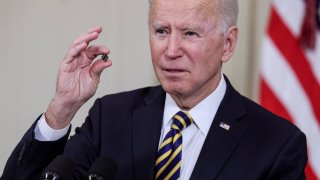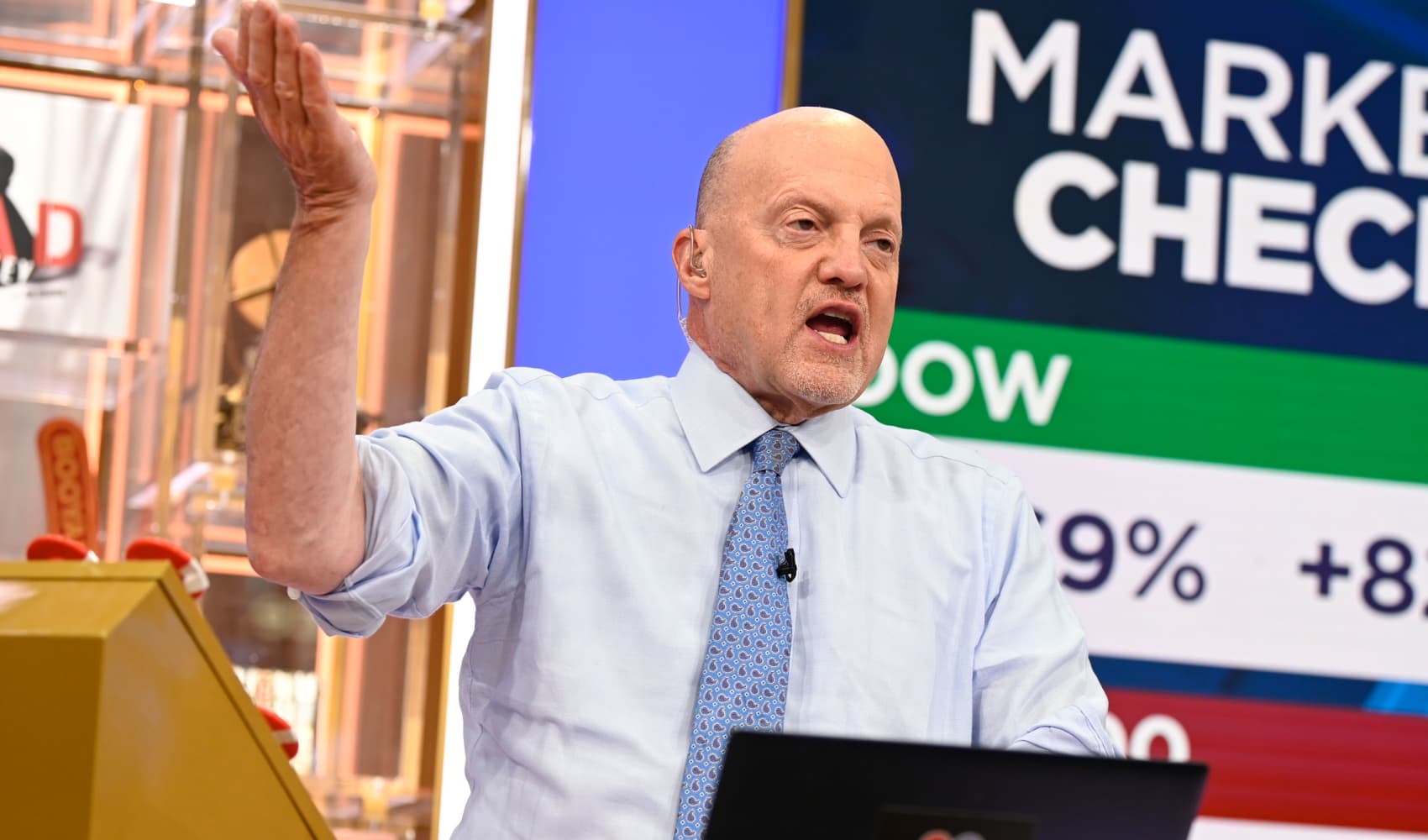
- Apple said on Thursday it lost the equivalent of $6 billion in sales due to chip shortages.
- The semiconductor shortage has led to calls for more chip production within the U.S. as part of shoring up supply chains for key technology across sectors including autos.
- A larger geopolitical rivalry between the U.S. and China over technology sovereignty and tech as a national security concern poses a threat to supply chain stability that will last longer than the current global manufacturing and logistics bottlenecks.
The semiconductor chip shortage is old news, but when the second-largest public company in the history of the U.S. stock market says it just left $6 billion in potential sales on the table as a result of limited chip supply — as Apple just did — it reinforces why the U.S. economy needs to rethink how it sources its semiconducting technology so that doesn't happen again. This short-term supply chain phenomenon will pass, but tech executives and policy advisors say the future may be one of even larger, longer-term supply chain shocks. A shift from decades during which the largest companies benefitted from a manufacturing model in which "designed in California" and "assembled in Asia" was king needs to occur to shore up the supply of key components.
From $2 trillion Apple to $1 billion lidar sensing technology marker Ouster, the supply chain policy of industry and government needs to change.
Get DFW local news, weather forecasts and entertainment stories to your inbox. Sign up for NBC DFW newsletters.
Mark Frichtl, co-founder and chief technology officer at Ouster, said as the maker of products that have dozens or hundreds of integrated parts, it needs to manage and make sure it can get all of those. "Anyone making electronic devices has to do that," he said, and it is now a global problem affecting all industries, whether phones or cars or Lidar sensors.
Results from the just-completed fourth quarter survey of CNBC Technology Executive Council members show the current labor shortage is the top concern cited across sectors (57%), more than twice those citing the supply chain (26%), but the two are connected.
"If a part becomes truly unavailable, companies need to find substitutes that could require additional engineering," Frichtl said. "Any company making electronic devices, they will look a little tired because of all the extra work they've been doing. It's not something we want to continue."
Money Report
Executives responding to the survey said an inability to upgrade their own technology was the second-biggest consequence of the supply chain bottlenecks.
"We need tech that is intuitive and easy to use to get people in here," said Mark Wheeler, director of supply chain solutions at Zebra Technologies. "To compete for them, better tools help us to do that. ... New people coming into enterprise have high expectations," he said.
Forty-one members of the CNBC Technology Executive Council responded to the Q4 survey, which was conducted Oct. 1-Oct. 15.
Biggest supply chain risks still in future
Policy advisors and executives across industries are worried that the business sector is not planning for the long-term supply shocks that may be far worse than what has been a short-term crisis.
The current commercial issues causing the supply chain shortages will end, but " what frightens me the most is the geopolitical ... the politics of this is just getting starting in Washington and Beijing," Dewardric McNeal, managing director and senior policy analyst at Longview Global, who worked for the Secretary of Defense on East Asia and China security relations during the Obama administration, said at a recent CNBC Technology Executive Council Town Hall.
Policy discussions about a semiconductor "rebalance" and "sovereignty of the supply chain" or "minimal viable manufacturing capacity" have McNeal concerned that industry is unprepared for what is coming. If not handled properly, the resulting situation could lead to mandates on companies to buy a certain percentage of domestic chips.
On Friday in an op-ed for The New York Times, Republican Senator Josh Hawley of Missouri outlined his proposal for a "made in America" rethinking of the supply chain including domestic content requirements.
"Telling me how to allocate is bad for a chip CEO. Telling me where I need to locate is bad. So I'm concerned we have a real train wreck coming even when we got beyond some of the short-term stuff," McNeal said. "The man-made stuff, the political stuff, I don't know if industry is quite prepared to really understand how bad it is going to get between Washington and Beijing."
The auto industry is a good example, where the chip shortage continues to wreak havoc for carmakers. The car industry is all about efficiency and gaining scale, and in a future scenario in which companies have to start divvying up semiconductor buying based on a government mandate, "you start chipping away at these economies of scale," said Mark Fields, former Ford CEO and current interim CEO at Hertz, on the recent CNBC TEC Town Hall. "It's not a good economic choice."
Fields said over the past half-decade, many of the economic decisions made by automakers on where to source supply did not take into account the recent geopolitics and trade decisions and that may yet come back to haunt the automakers. "I think some manufacturers will be pretty surprised to see the economic decision or rationale that was so compelling back then really didn't turn out to be the case. So I think there is going to be a lot of soul-searching over what's the best thing to do to balance both the economics and the geopolitics of this."
The cost of disruption in recent years from Covid and trade has been significant and that has to result in companies rethinking supply chains and accepting that increased costs may be worth it if they de-risk the business "from some of those unknowns that can hit your business very significantly as they have in the past few years," Fields said.
The long tail of Huawei
Matt Murphy, CEO of Marvell Technology, which designs chips but outsources the manufacturing, said the situation should be on everyone's radar, and it has been on his at least since the events of 2018 related to the Trump administration and Chinese cell phone maker Huawei.
Murphy, who was head of the semiconductor industry trade association during that period, said the Huawei situation was "the undeniable signal if there ever was a signal sent about what the U.S. was prepared to do."
He said the politicians are dealing with substantial issues of importance to the industry, from IP theft originating in China to China's broader flouting of World Trade Organization rules, but the extent to which the U.S. government went after Huawei — from targeting handsets all the way to its ability to procure components for enterprise gear — was a surprise. And he added the situation has not changed in ways executives expected it would. The Biden administration has "doubled down" on the policies of the prior administration, he said.
"If there is only one thing Congress and government officials can agree on ... it's China," Murphy said. "If Huawei is the preamble for what's to come, it's additional risks."
Chips and economic competitiveness
Ouster buys and sells a significant amount of material in China and a worsening of the trade relationship between the U.S. and China is bad for almost everyone, Frichtl said. But for the business community, he said the argument needs to be made in terms of economic competitiveness rather than saber-rattling.
"What people want is the existence of a U.S.-based supply where right now it doesn't really exist," Frichtl said. "The investment to form those fabs can be thought about in a national security context, but it is also purely economic development."
One of the largest chip contract manufacturers in the world, Taiwan Semiconductor Manufacturing Company, is building a plant in Arizona.
The federal government also has been considering a $50 billion-plus spending effort to build a domestic chip industry — in the most recent version of the Biden spending plan there is an advanced manufacturing credit for chip production.
"We need a company like TSMC [Taiwan Semiconductor Manufacturing Company] in Arizona times 10, and many more in the U.S. if we want security from interruption," Frichtl said.
The way to avoid mandates on domestic component sourcing is for government and industry to work on the creation of a U.S.-based supply of semiconductors that is economically competitive. "TSMC is a global company, and they want those Arizona fabs competitive, so we just need to make sure policies we create here encourage economically competitive supply, not just have a mandate you have to buy 25% from a U.S. supplier," Frichtl said.
In addition to the national security risks, he said there is simply too much geographic concentration of the world's most advanced fabs in Asia, and a single calamity could take them out. A year from now, the acute shortages could be over, every part needs available and on reasonable lead times and global semi capacity at a high level of utilization.
"In the event of a flood or earthquake and we could fall back into this issue. ... I would argue this has demonstrated to the world that there's this thing [semiconductor manufacturing] that's really important to the functioning of the most valuable businesses, like Apple, which has to get semis to make phones, and if we don't create policy around ensuring day to day supply that can absorb minor shocks we will be in this situation again. We are having a shortage now, but it could be no new chips and that would be catastrophic," Frichtl said.
Autos got a taste of that after the Fukushima nuclear disaster, according to Fields, which led the companies to realize the importance of at least having deeper layers of knowledge and visibility into multiple tiers of their supply chains.
"What we have seen, the disruption of the last 18 months and even before that, has shaken a lot of companies to their core in terms of how they view the supply chain," Wheeler said.
Supply chain models have been built to deliver service to the market at the optimal cost, and they were built with assumptions about supply availability and transport availability and cost, and many of those assumptions have been made invalid by the market reality. "Without the assumptions being true, there is a premium on visibility. If you don't know what you have and where it is, you can't plan and reoptimize," Wheeler said.
"The shortages we are experiencing now are causing companies to understand how their supply chain policies may be in a very dynamic environment. What that comes down to from our perspective is a premium on supply chain visibility and customers want to improve that. Where is our stuff, not only in the enterprise but at the dock, plant and warehouse," he said. "Securing the supply chain is critical right now and it will be with us for a while."
In the past, buyers might play one vendor against another until the last possible moment to obtain the best possible price, but now buyers will be willing to pay for capacity in advance or sign up for take-or-pay agreements, which would include a potential penalty.
"We're viewing this as a shift to capacity being strategic, not just an afterthought," Murphy said.
McNeal said the concepts being weighed including technology sovereignty and near-shoring outlined in legislation like the $50 billion CHIPS Act are part of the process of industry and government understanding expectations and level-setting, but he isn't convinced that everyone is on the same page domestically, or globally with allies in Europe and southeastern Asia when it comes to coalescing around a rebalancing of supply chains. "I am not so sure our European and ASEAN friends are really fully on board, not sure how to really navigate the geopolitics of the supply chain," he said.
History does include an example of how economic development of a domestic tech manufacturing hub can lead to a larger economy.
"Silicon Valley came to be what it is now because there were Silicon fabs in the Valley," Frichtl said.






